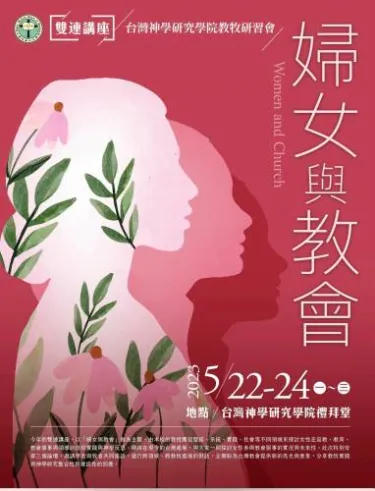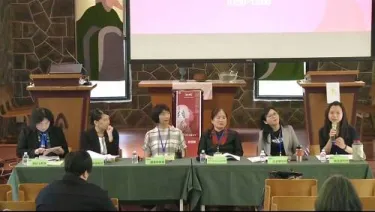Women and the Church
A Letter from Jonathan and Emily Seitz, serving in Taiwan
Subscribe to our co-worker letters
Dear friends,
Taiwan Seminary recently hosted its Shuanglian Lectures. These are a set of annual lectures held to encourage pastors in their work. This time the theme was “Women and the Church.” In the past, the seminary would often invite a famous speaker from abroad but during COVID moved to a new system where eight or 10 speakers plus eight or 10 respondents give shorter lectures on a common topic. With the focus on women in the church, a mix of Bible, theology, music, counseling and preaching professors shared. Many alumni (mostly women!) came to the lectures, as well as current students. Jonathan brought students to several of the lectures.

Chiu Kai-Li lectured on a hundred years of Presbyterian “Bible women.” She divided it into several periods: the missionary era (1872-1921), a period of independent Bible women (1922-1958), institutionalization (1959-1987), and a period of women’s empowerment (1988-present). Taiwanese Presbyterians have had a mix of reactions to women in leadership. On the one hand, the first woman was ordained as a pastor in 1949, but it was only around 40 years later that women began to enter the ministry in large numbers. Today there are around 500 ordained women pastors, although they are still underrepresented in most institutions of the church.
With “Women in Ministry” as the theme, Bible teachers from Taiwan Seminary talked about several different passages: the conversion of Lydia in Acts 16 and Lois and Eunice in 2 Timothy 1:5 (Isa Walis), Sarah and Hagar in Genesis (Tsan Tsong-sheng), a challenging passage about childbearing in Galatians 4 (Menghun Goh), and Deborah and Jael in Judges 4 and 5 (Hsu Wan-lin).
Lin Wen-Chuan lectured on Hildegard von Bingen’s Ordo Vertutum, a famous sacred music drama composed around 1151. Liang Yuehmei shared about Tiuⁿ Chhang-miâ, the wife of founding missionary George Leslie Mackay. Liang described Tiuⁿ’s own ministry, her work as an evangelist and seminary teacher and her contribution to early mission. Liang also described the contemporary debate (primarily in the evangelical world) over egalitarianism and complementarianism.
Hu Jui-chi, one of our counseling professors, used Bronfenbrenner’s Ecological systems theory to discuss married women working full time. Based on a series of interviews, Hu talked about how women often face multiple and conflicting roles, and struggle to get support from their communities. A final lecture, by the Seminary’s principal, Tsai Tzu-lun, treated the topic of “Women and Preaching: A Rising Voice in the Church.” She offered a summary of how preaching theory and women’s preaching have changed in the academy and the church over the last 50 years.

Jonathan’s mother is a retired pastor and lately, he’s taken to wearing her stoles when he preaches. We are both children of the 1980s and have seen women’s roles shift dramatically in the U.S. Emily was ordained as an elder in her twenties. Sometimes we look enviously at Taiwan, where a female president, Tsai Ing-Wen, has become a global model for strong leadership. As a couple, we face our own challenges over how to share work and job responsibilities, and it can feel like our communities have a lot of (unsolicited) opinions for us on how best to do this. It is reassuring to hear about women in the church “from the beginning” and the shifting roles they have had in history. The benefit of a series of lectures like this is that with a chorus of different voices, we get different perspectives on the church and hopefully something like a vision of how things could be.
We pray for the Lydias and Eunices, and Deborahs and Jaels of the church, for those who are wise, and strong, brave and fierce. We thank God for judges and poets, Bible women, elders and preachers. We thank God for the ways God’s grace and transformation ripples across the generations and the years. We pray for more balance and justice, more equity, and more cooperation. Amen.
Jonathan and Emily
PS: We are on Interpretation Assignment through early September and welcome connection while we are back. We will be based in Atlanta, Birmingham and Cincinnati.
